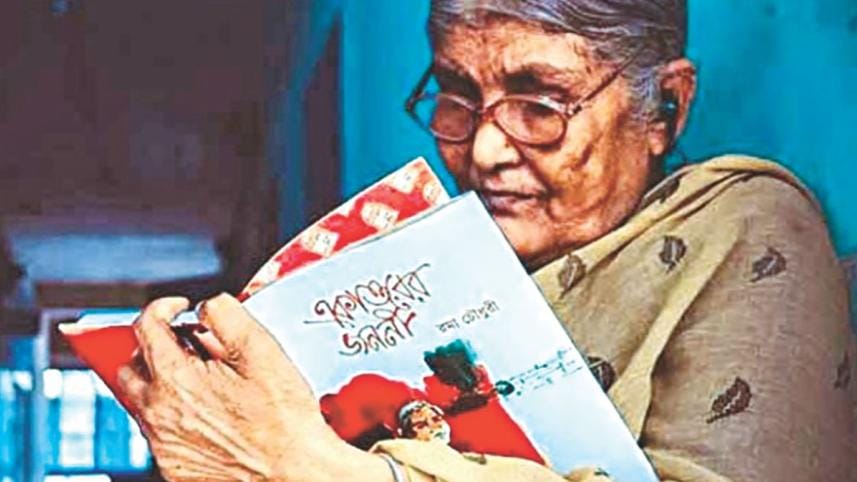The lonely path that Rama Chowdhury walked

Jodi tor daak shune keo na ashe, tobe ekla cholo re (If no-one heeds your call - then walk alone). The indomitable Rama Chowdhury, known to many as Ekattuker Janani (Mother of '71), had made this line from the famed Tagore song the guiding ideal of her life. She left us on September 3, possibly with a heavy heart, an unexpressed grudge against society, and a disgust towards life. In her life, she was not one to talk about her own grief and pain. And ironically, the society and people who failed to give her the respect she deserved while alive, are talking about her now that she has passed away. In her life, all she knew was struggle.
It was no ordinary feat in the '60s for a woman to receive an MA degree in Bangla language and literature. Rama Chowdhury was the first woman from southern Chittagong to get an MA degree. After that, she chose teaching as her vocation. She was, even then, a symbol of women's empowerment and freedom.
Then came the Liberation War. The war would change forever the life of this bright young woman, then a mother of three. At the time, she was at her father's house at the Popadia village in Chittagong's Boalkhali Upazila, with her mother and children. Her husband had crossed over into India. What followed was heart-breaking. The occupying Pakistani military attacked their home. Rama Chowdhury was raped and tortured, in the presence of her mother and children. And the Pakistani forces did not stop there—they set fire to her house so that no trace would remain of the family.
What happened afterwards is even more depressing. Fighting the horrors of the war, she took her mother and three children and wandered the streets, spent nights in forests. No one provided her any shelter, support or empathy. The Liberation War had ended, but Rama Chowdhury's battle did not—it only increased manifold. This society would not accept her and treat her with the dignity and honour that she deserved. Sadly, extreme poverty and harassment destroyed her and her family. She lost three of her children Sagor, Togor and Tunu.
Life goes on. To survive, Rama Chowdhury took up the pen. She authored 18 books, including Ekatturer Janani. Not only did she write the books, but she sold them herself, walking door to door. She did this till 2017, refusing to let physical suffering and illness dissuade her, providing for herself and her one surviving son. And throughout this time, except two or three people, no one was there to help her. She treaded the path alone, and later, when offers of help came, she refused them. The fact that she got no help when she needed it most had probably left a deep wound.
Known as Janani Shahoshika (The brave mother), Rama Chowdhury was not only a freedom fighter, but also a mother. The anguish of losing three children took its toll. Society had refused to accept her, and she had lost all that she had ever valued—three of her children—she had never forgotten that. So, braving every form of suffering, she had refused to bow down and refused to ask for help. For 30 years, she walked barefoot. When asked, she would reply: "How can I tread with shoes on the soil where my children sleep?"
Rama Chowdhury may have not asked for pity and help from society, but what have we, as a society and a state, done for her? The country, for which she suffered through extreme violence, lost her home and her children—what did that country give her except negligence, pain and disrespect? Why did we fail to give her the honour she deserved in life? We should be ashamed.
For this brave woman, the war started in 1971 and ended on September 3, 2018, when she breathed her last at the Chittagong Medical College Hospital. She had been suffering for some time from various physical ailments. How much can one bear? And so she has joined her children in death leaving behind a life of pain and struggle. She is survived by her only living son, Jahar Lal Chowdhury. People like Rama Chowdhury deserve recognition and respect in their lifetime. Can we not stand beside these fearless people while they are still alive?
Shahana Huda works in communications.
Translated from Bangla by the editorial team.



Comments